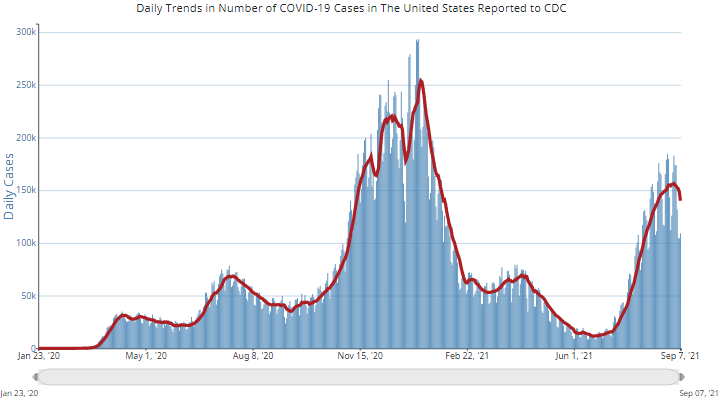Boston – With an August 31 poll showing that two-thirds of organizations have delayed office re-openings because of COVID-19 variants, let’s look at this week’s health policy responses and the bearish or bullish developments related to the pandemic.
Health policy responses
- Israel is planning to administer a fourth COVID-19 shot that could be adjusted to fight variant strains. The country’s COVID czar says people should expect to receive a vaccine every five to six months. Despite having 63% of its population double-vaccinated, Israel is experiencing twice as many cases per capita as the U.S. However, hospitalizations are half that of the U.S.
- Social gatherings and interactions at work in Singapore were prohibited beginning September 8. Although over 80% of the country’s population has been vaccinated, there has been a rise in community transmission.
- Nearly four dozen individuals in the U.K. who were deliberately infected with COVID-19 will receive $8,300 each to participate in the human challenge trials.
- Some airlines, mostly in Europe, are requiring surgical masks or respirators. Airlines cited the lower efficacy and lack of standardization of cloth masks.
- With Dr. Fauci defending COVID vaccine boosters, saying 3 shots will “likely” be the new norm, experts are debating whether to call the third dose a booster or the final dose.
- USA Today reported that at least 1,000 schools in 35 states have already closed for in-person learning since the start of the school year due to COVID-19 outbreaks.
- Florida will start issuing $5,000 fines to businesses, schools and government agencies that require people to show proof of a COVID-19 vaccination. A Democratic challenger to the Governor said this is “an insult to the free market principles that he claims to champion.”
- As of August 31, 66% of organizations are delaying office re-openings due to COVID variants, according to a Gartner survey. For example, Google pushed its mandatory return to office date from September 2021 into 2022, with specific RTO policies customized to countries and offices after January 10.
- In a Willis Towers Watson survey polling nearly 1,000 companies that together employ almost 10 million:
- 52% plan to have vaccine mandates by the end of the year (including 21% that already do).
- 78% plan to track employees’ vaccination status (55% already do).
- 17% are considering health insurance premium rewards or surcharges to encourage vaccination (2% already do).
Bearish virus developments
- Intensive care unit update: In Oregon, only 50 of the state’s 638 ICU beds were still available. Central Texas, which includes Austin, ran out of ICU beds this weekend. And Alabama is short 181 ICU beds, which means dozens of patients are being forced to wait in emergency rooms or other parts of hospitals, according to the New York Times.
- A Science Advances research article notes that the Alpha, Beta and Gamma variants can, to some extent, evade immune response, as measured by sharp reductions in the binding kinetics (ability) of neutralizing antibodies.
- The Washington Post provided FAQs on the Mu variant first identified in Colombia in January 2021. Health officials believe Mu is even more transmissible than the Delta variant and has the potential to resist vaccines. Approximately 2,000 Mu variant cases have been detected in the U.S. across 49 states.
- Results from a new study reveal that nerve fiber loss and increased dendritic cells on the cornea may help to identify long COVID.
Bullish virus developments
- Dr. Fauci said the Mu variant is “not at all even close to being dominant.” Well-regarded scientist Trevor Bedford says the Mu variant will soon be displaced by Delta.
- Breakthrough COVID cases in Massachusetts are about 40% of infections. However, unvaccinated people are 74% of hospitalizations, despite the unvaccinated accounting for only 33% of the state’s total population.
- Based on CDC data through September 7, cases appear to have peaked in the U.S.

Economic and other developments
- Mike Ryan, executive director of the World Health Organization’s Health Emergencies Program, thinks “This virus is here to stay with us and it will evolve like influenza pandemic viruses.”
- A very small study got statistically significant results suggesting that people who live on the coastline are less likely to catch COVID-19. The thesis is that salt air helps keep the nasal passage moist. The authors note that wearing a mask also hydrates the airway. Respiratory infections are believed to transmit more efficiently when the nasal passage is dry.
- U.S. residents are not legally allowed to know which variant gave them COVID-19. According to Business Insider, that is because genome sequencing has not been federally approved.
- Analysis in the New York Times indicates that the odds of the average vaccinated American contracting COVID-19 are about one in 5,000 per day — a 1% chance over a seven-week period, or 7.5% chance in a year at current COVID incident rates.
- An oxygen shortage forced a Texas refinery to shut part of a unit. Executives cited increased medical demand for the gas.
- Video game companies that moved to remote work during the pandemic had more delays in new products than before the pandemic, while those that worked in person did not. Research suggests that “weak ties” — colleagues with whom you do not work closely — may be important to creativity and innovation.
Source of all data: Eaton Vance Research as of September 9, 2021 unless otherwise specified.

